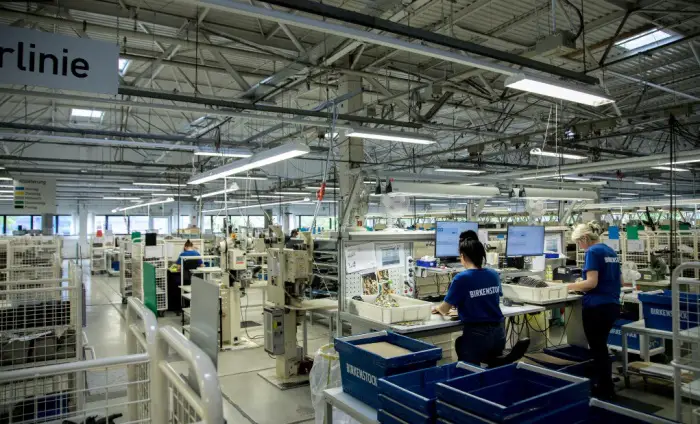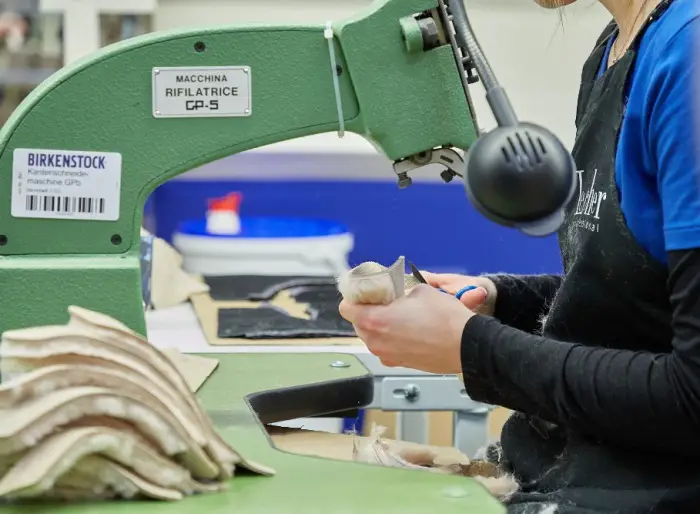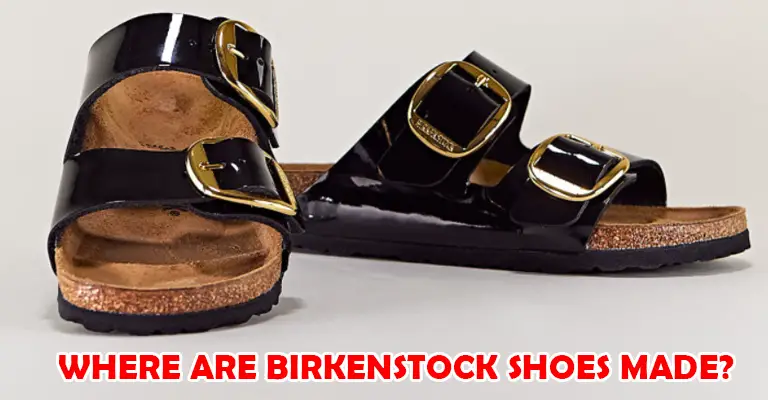Blog
Where Are Birkenstock Shoes Made?
Birkenstocks were a fashion staple among hippies in the 1960s and 1970s. Nowadays, they are well-known for their chic, ultimate comfort, and athletic appearance.
So, where are Birkenstock shoes made? Are they assembled using raw materials from Germany, in Europe, or from affordable sources in Southeast Asia?
Let’s investigate the rich history of Birkenstock to see how this brand has maintained the German quality of its orthopedic footwear products for decades.
Contents
Where Are Birkenstock Shoes Made?
Unlike other footwear brands, all Birkenstock footwear products originate in Europe. Birkenstock sandals and orthopedic footbeds are made in Germany, while its boots and shoes are made in European countries.
Over 6,200 employees are working in Birkenstock’s owned factories in Germany and Europe (as of 2023), with around 25% of employees in the industry. Birkenstock is also the largest employer in the German footwear industry.
Germany

Most Birkenstock footwear products originated in their home country, Germany, with a solid commitment to the German standard.
Until 2023, there are 5 owned manufacturing plants of Birkenstock in this country, located in:
- Bernstadt (Alb-Donau, Baden-Württemberg).
- Ebersbach Industrial Park (Görlitz, Saxony).
- Sankt Katharinen-Stroedt (Rhineland-Palatinate).
- Steinau (Hesse).
- Berlin-Szczecin Industrial Park (Pasewalk).
Birkenstock has contributed significantly to the German footwear industry and local economic growth by maintaining most of its shoemaking in Germany.
As of 2013, Birkenstock created more than 1,000 new jobs, almost all in Germany. As of 2018, 4,253 out of 16,455 (around ¼) workers in the German footwear industry were at Birkenstock’s plants.
Among the 5 plants, Birkenstock’s two most extensive laboratories – the chemical laboratory in Bernstadt and the technical laboratory in Sankt Katharinen-Stroedt.
In 2021, these two labs were improved to serve the rising production demand of this brand, with a total investment of 4.5 million euros.
They worked together to filter all harmful chemicals in raw materials and applied the latest technologies to Birkenstock’s products.
Bernstadt – Where shoe uppers and liners are made.
Bernstadt is the first-owned production facility of Birkenstock and the beginning of everything for this brand. This facility was established on July 1st, 1991, in the Bernstädter Baumwollspinnerei – a cotton mill in the region.
This plant was first assigned to make shoe uppers and buckles, then footbed liners.
With over 30 years of development, the Bernstadt Center has undergone various improvements.
In 2020-2021, there was a newly opened laboratory in this facility to check harmful substances on raw materials before shoe products.
In 2021, the brand spent around 2 million euros on modernizing the office area and opened a new contemporary social space to improve the working conditions of workers here.
Another 1 million euros was spent to set up a new leather product line.
The Bernstadt facility of Birkenstock has a total area of 20,000 square meters, with 850 employees working here as of 2021.
Also, up to this year, more than 30,000 footbed linings and 100,000 pairs of shoe uppers are made daily. This facility uses leather from 485,000 cattle annually to make its footwear products.
The Bernstadt factory is where Birkenstock blends automation and German craftsmanship. In some stations in this facility, shoe workers process leather by hand without high-tech machinery.
Ebersbach – The heart of Birkenstock sandals and its signature footbeds.
The second largest Birkenstock factory is located in the Ebersbach Industrial Park, Görlitz, Saxony, near the German/Polish border.
This factory is where Birkenstock sandals and its signature cork-latex foodbeds are made. As of 2018, 12.5% of Birkens have been made in this factory.
This Birkenstock factory is between the German (Görlitz) and Polish borders (Zgorzelec). Thus, it has various advantages in terms of geographical position and economy.
The location helps this brand support the economic growth of Germany and Poland by utilizing the talented workforce from both countries.
The Birkenstock factory is also one of the 3 most prominent employers in Görlitz. Nonetheless, it has also been the main sponsor for the annual Europamarathon and supported many youth teams on its production sites.
As of 2019, more than 100,000 pairs of Birken sandals and shoe components have been made in this facility. The year 2019 also marked various improvements and changes in the Görlitz factory, including:
- Birkenstocks spent over 3 million euros to establish a new social building and upgrade its production facility, aiming to have better brand awareness in the region.
- The brand also opened a new chemical Central Laboratory to expand its production capacity on shoe components (buckles, shafts, rivets) from many materials (textiles, metal, plastics).
Check more: What Are Birkenstocks Made Of?
Sankt Katharinen – Technical test laboratory
The third Birkenstock factory in Germany is located in Sankt Katharinen, Rhineland-Palatinate. This factory is also the technical test laboratory for the brand.
In 2021, there have been various enhancements in the internal workshops of the Sankt Katharinen Center. This lab and the chemical lab in Saxony had a total investment of 4.5 million euros.
Not only a laboratory for product development, the Sankt Katharinen plant also serves as a golden land for talent development.
Steinau in Hesse
Another factory of Birkenstock in Germany is in the Uerzell district of Steinau, formerly the Alsa shoe factory.
Yet, there are no public details on the opening date, the production capacity, and related footwear production activities in this manufacturing plant.
Berlin-Szczecin – The latest factory of Birkenstock.
The fifth and also the latest factory of Birkenstock is located in the Berlin-Szczecin Industrial Park, Pasewalk, in the Northeast region of Germany. This factory started its operations on September 5, 2023.
The Berlin-Szecin factory is the most significant investment by Birkenstock, costing 110 million euros. From the initial point of 200 employees, the brand aims to reach 1,000 employees shortly.
Since the fall of the Berlin Wall, Birkenstock has focused on footwear production in Germany.
The opening and operation of these 5 German factories reflect the brand’s values – bringing German-origin footwear products with the highest quality and latest innovations to the global market.
European countries
Besides the 5 German factories, Birkenstocks also makes footwear products in European countries, especially shoes and boots. It imports 90% of its shoe components and raw materials from Europe.
Portugal can be called the center of European production of Birkenstock. All closed-toe shoes of the brand are manufactured in Portuguese workshops with a rich heritage of craftsmanship.

Cork – the main component of Birkens – is why Birkenstock focuses its shoemaking on Portugal. More specifically:
- Cork is a sustainable agricultural product in Portugal. The cork industry in Portugal is famous for its sustainability. Unlike other agricultural products, cork doesn’t require clearcut to create space.
- Cork production is cruelty-free. All Portuguese cork farmers work in safe and clean conditions. They are fairly paid.
- Shipping cork from Portugal to Germany is cost-effective. Since Portugal is close to Germany, it takes fewer environmental impacts and less effort to import cork to Birkenstock factories in Germany.
Apart from Portugal, there is no extra information on the footwear production of Birkenstock in other European countries, at least for now.
How Birkenstock Shoes Are Made?
Birkenstock has committed to making the majority of its footwear products in its own factories in Germany. This promise undeniably reflects the mission of the brand – to bring comfort and protection to all of its products.
Every pair of Birken undergoes 17 steps and the work of more than 100 skilled workers to finish. Closed shoes of this brand are assembled in its own workshops in Portugal – a nation known for a rich heritage of hand craftsmanship.
Instead of relying entirely on new technologies, Birkens are made by skilled shoe artisans in German and European countries. In some stations of its Benstadt factory, workers mark and cut leather by hand with no high-tech machinery.
This old-schooled process results in unique pieces of leather that machines cannot capture.
Birken shoes comprise different materials, most recycled or sourced from sustainable European sources.
For example, the signature insoles of the brand come from 3 typical materials, including suede, standard leather, and micro fibre. Plus, cork, natural latex, brass, copper, wool felt, and fine leather.
The core product of Birkenstock is its anatomically shaped footbed, invented in the 1930s. This footbed is made from renewable materials – cork and latex – in a secret formula, with two layers of jute and a suede lining.
Moreover, the footbed has curves to support the most minor areas of your foot. For this reason, Birkens are highly recommended for your feet’ health, especially for people with foot-related problems.
Apart from the traditional cork-latex footbed, the brand has offered the EVA version since 2015 with a more affordable price tag.
The new footbed is more lightweight and waterproof. In 2018, EVAs represented 15% of the 25 million footwear products the brand made annually. Also, in that year, its sales volume reached $800 million.
All Birkens meet the highest quality standards in the European footwear industry, whether produced by hand or by industrial methods.
Final Words
Birkenstock shoes are manufactured mainly in 5 owned factories in Germany, with another small number in Portugal and other European countries.
No matter where Birkens are made, they align well with German standards and adhere to the strict quality certifications of the European footwear industry.

